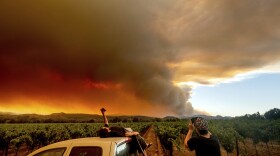
David Welna
David Welna is NPR's national security correspondent.
Having previously covered Congress over a 13-year period starting in 2001, Welna reported extensively on matters related to national security. He covered the debates on Capitol Hill over authorizing the use of military force prior to the wars in Afghanistan and Iraq, as well as the expansion of government surveillance practices arising from Congress' approval of the USA PATRIOT Act. Welna reported on congressional probes into the use of torture by U.S. officials interrogating terrorism suspects. He also traveled with Defense Secretary Chuck Hagel to Afghanistan on the Pentagon chief's first overseas trip in that post.
As a national security correspondent, Welna has continued covering the overseas travel of Pentagon chiefs who've succeeded Hagel. He has also made regular trips to the U.S. naval base in Guantanamo Bay, Cuba, to provide ongoing coverage of the detention there of alleged "foreign enemy combatants" and the slow-moving prosecution of some of them in an episodically-convened war court. In Washington, he continues to cover national security-related issues being considered by Congress.
In mid-1998, after 16 years of reporting from abroad for NPR, Welna joined NPR's Chicago bureau. During that posting, he reported on a wide range of issues: changes in Midwestern agriculture that threaten the survival of small farms, the personal impact of foreign conflicts and economic crises in the heartland, and efforts to improve public education. His background in Latin America informed his coverage of the saga of Elian Gonzalez both in Miami and in Cuba.
Welna first filed stories for NPR as a freelancer in 1982, based in Buenos Aires. From there, and subsequently from Rio de Janeiro, he covered events throughout South America. In 1995, Welna became the chief of NPR's Mexico bureau.
Additionally, he has reported for the Canadian Broadcasting Corporation, The Financial Times, and The Times of London. Welna's photography has appeared in Esquire, The New York Times, The Paris Review, and The Philadelphia Inquirer.
Covering a wide range of stories in Latin America, Welna chronicled the wrenching 1985 trial of Argentina's former military leaders who presided over the disappearance of tens of thousands of suspected dissidents. In Brazil, he visited a town in Sao Paulo state called Americana where former slaveholders from America relocated after the Civil War. Welna covered the 1992 United Nations Earth Summit in Rio de Janeiro, the deforestation of the Amazon rainforest, the mass exodus of Cubans who fled the island on rafts in 1994, the Zapatista uprising in Chiapas, Mexico, and the U.S. intervention in Haiti to restore Jean Bertrand Aristide to Haiti's presidency.
Welna was honored with the 2011 Everett McKinley Dirksen Award for Distinguished Reporting of Congress, given by the National Press Foundation. In 1995, he was awarded an Overseas Press Club award for his coverage of Haiti. During that same year he was chosen by the Latin American Studies Association to receive their annual award for distinguished coverage of Latin America. Welna was awarded a 1997 Nieman Fellowship at Harvard University. In 2002, Welna was elected by his colleagues to a two-year term as a member of the Executive Committee of the Congressional Radio-Television Correspondents' Galleries.
A native of Minnesota, Welna graduated magna cum laude from Carleton College in Northfield, Minnesota, with a Bachelor of Arts degree and distinction in Latin American Studies. He was subsequently a Thomas J. Watson Foundation fellow. He speaks fluent Spanish, French, and Portuguese.
-
The Minnesota Democrat was President Jimmy Carter's vice president and the Democratic nominee for president in 1984. He's lauded for humor and transforming the vice presidency, but also for decency.
-
Gov. Gavin °µºÚ±¬ÁÏom says an area the size of Rhode Island is now ablaze in his state. He's looking for help from other states and the federal government.
-
The report concludes Wisconsin voters who braved the pandemic and went to the polls in April did not see a surge in COVID-19 infections, although another study reaches the opposite conclusion.
-
A U.N. Security Council vote on a U.S. bid to extend an arms embargo against Iran failed last week. Now the U.S. secretary of state wants to bring back all sanctions lifted by the Iran nuclear deal.
-
The economic toll of the pandemic has led to the loss of nearly a quarter million jobs for child care providers, nearly all of whom are women and disproportionately Black or Latina.
-
Half a dozen top executives at the U.S. Agency for Global Media were ousted this week, the latest in a shake-up that started with the arrival of a conservative filmmaker as the agency's new chief.
-
Sue Gordon was in line to be acting director of national intelligence after Dan Coats quit last year. President Trump thought otherwise. Gordon now recounts her time in his administration.
-
Defense Secretary Mark Esper and his Chinese counterpart lectured one another in a 90-minute call as the highest level U.S. delegation in four decades plans a provocative visit to Taiwan.
-
The judge cites the coronavirus pandemic in blocking the Trump administration's attempt to widen the criteria for what makes an immigrant a "public charge."
-
The lethal march of COVID-19 passes 100,000 deaths in the U.S. despite some predictions it would not. The grim milestone presents a moment to consider who has died and how many others might follow.











